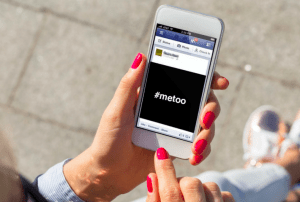
One evening after school when I was 15, a film crew were positioned at the end of my lane, so I decided to take my dog for a walk and go and watch the filming. Not much else happened in my sleepy village so it was all quite exciting. I joined a group of people all watching and a man in his 50s started talking to me. At first I didn’t think it was anything to be concerned with, but as he bent down to pet my dog he made a comment about my legs that left me cold. I knew immediately that this person was not to be trusted. He then started asking me whether he could come and walk the dog sometime with me – apparently he knew where I lived and was insistent. I made some obliging, polite noises like, “Um… maybe. I’m pretty busy with school…” and left to walk the dog alone. 10 minutes later, the man appeared by my side, asking to walk with me. In my young mind I thought that if he walked with me now, maybe he would leave me alone. Maybe he wouldn’t appear at my door. So we walked. Once we were alone and out of sight of anyone he grabbed my shoulders. I was much smaller than him and faster, so ducked out of his grasp and ran home to my empty house, terrified and waiting for him to appear. He didn’t. A couple of weeks later I saw him again. This time he shouted at me and chased me and I had to run away from him and lock myself back in my home again, praying that he wouldn’t follow me. This was harassment at the age of 15. And he knew how old I was – I was in my school uniform.
The campaign #MeToo has been gaining traction in the last few days, in the wake of the Harvey Weinstein scandal, as women have been sharing their own stories to demonstrate how widespread sexual harassment is. It’s shocking to see how many people have their own stories of abuse and harassment to tell, and how much of it has been normalised within our society. Several stories I’ve read have involved women being groped against their will in pubs or nightclubs, and being left defenceless when security hasn’t helped the woman get away from the perpetrator. The one time I punched a person was in exactly this situation. I was standing in a queue and someone behind me lifted up my skirt and was groping me, trying to move my pants aside. I wasn’t able to move away as I was penned in by people and so I turned and hit him. And I got told off by a bouncer for it. It’s this acceptance of scary and inappropriate behaviour that has encouraged the perpetrators to keep going, to offend repeatedly, and that is a dangerous precedent to set.
This also includes the victim-blaming that surrounds these incidents. After being followed, my family were furious with me. Yes they were worried and trying to protect me, but I felt like the whole thing was my fault; that my skirt was too short; that I should have just said no to walking the dog; that I shouldn’t have continued to walk after he was being creepy. The list goes on. And with hindsight maybe it seemed sensible advice, but a 15-year-old girl being expected to know how to handle the advances of a man four times her age and twice her size is ludicrous. And the way that made me feel as though I was to blame is unacceptable. No man has the right to lay a finger on a woman unless she gives her permission for him to do so, and I absolutely did not.
My ex claimed that me wearing shorts was the reason a man slowed down on a busy road as I was walking along, minding my own business, shouting something about me being a prostitute and how much would I charge. Just think about that. Its 25 degrees and I wore shorts and a t-shirt in public. Of course that means I deserve to be harassed and humiliated in front of everyone else walking along that street. And the shame that all this brings! The embarrassment that comes from men openly leering or touching you. The wondering if you had done something different, would it have happened? The questions: whether you really did lead someone on, albeit unintentionally, whether you were strong enough with the word ‘No’. Could it have been misinterpreted?
I remember a friend of mine coming out with me one evening. He tried to kiss me and I said no. So he tried again. I tried to let him down gently and said no again. This went on for a good portion of the evening, him pushing himself on me at every opportunity, refusing to believe that no actually meant no. Eventually I had to really shout at him to leave me alone. At which point he went home without a word, leaving me alone and drunk in a pub. And I felt guilty about that. I felt like I had led him on, that I shouldn’t have been out with him, that I was too harsh on him. I honestly can’t say whether or not he woke up the next day feeling guilty for having forced himself on me, but he certainly didn’t try to find out if I got home safely.
So this campaign is excellent stuff for giving women a voice to speak out and to show how widespread this problem is. But in order for it to make a difference, it’s the men in our communities that need to take note. If they don’t want their children growing up scared to walk down a street alone, then they need to set the example for how to treat women. Instil in our sons the idea that no means no, and in our daughters that saying no is absolutely fine in any circumstance. Men, if you see a man harassing a woman – even if it’s catcalling – walk with her, ask if she is OK. If your friend sees it as OK to grope a woman, call him out on it. And remember that almost every woman you know will have been harassed at some point, so catcalling and comments may seem harmless to you, but for many women that in itself is scary, as we are the ones that know from experience where those comments can lead.

